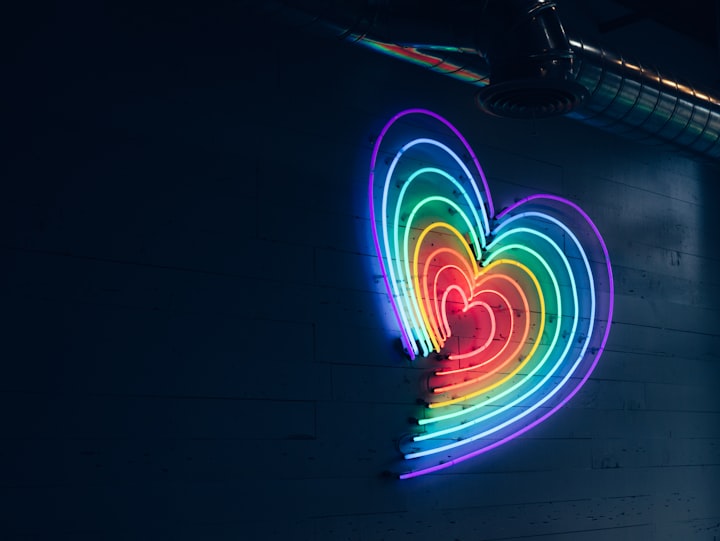Pink Triangle Redemption
A Love Letter to the Best of Us

Design majors would agree that triangular logos are quite a rare sight. Unlike round and square ones, it is intriguing but difficult to work with. Thus, we only have a handful of known brands such as Adidas, Guess, and Prada sporting this controversial shape.
Yet the payoff is evident. It’s ingenious and mysterious. A triangle is visually attractive due to its symmetry, which is further enhanced when the lengths of its sides are equal–stability, strength, and harmony being some of the words one would incorporate it with–a representation of perfection.
A shape vilified by the Nazis when they marked thousands of gay male prisoners with pink inverted triangles and subjected them to harrowing and inhumane conditions in concentration camps.
Adolf Hitler viewed queer people as a stain on his idea of perfection. As inverted triangles are associated with femininity, he used them to dehumanize and insult gay men, criticizing them for their “perversion” of his idea of masculinity.
But he failed to see a message of movement beneath the inverted pink triangle. Decades after his notorious reign of terror, the queer community is thriving–the same can’t be said about his world-class army of bigots, on the other hand.
To commemorate the precious lives lost to homophobia, we owe it to the previous and current generations that have and are successfully keeping the fire burning.
For instance, there was Cheddar Gorgeous’ memorable runway look on the 6th episode of RuPaul's Drag Race UK, with the runway theme of “Tickled Pink.”
As a drag artist respected among her peers, Cheddar Gorgeous jolted the world with her exceptional homage to people living with HIV and the queer community.
Donning an all-black bodysuit that perfectly emphasized the pink triangle adornments all over her body, Cheddar Gorgeous walked the runway, understood the assignment, and left with a message.
For allies like me, her splendid presentation opened a new world–a wonderful way to raise awareness among people. A beautiful haunting reminder that before the LGBTQIA+ community has reached the level of liberation it enjoys at present, victims of discrimination and lawless persecution live among us and continue to live out the horrors they had to go through.
Discovering that a cohort of college students were the trailblazers in reclaiming the pink triangle is a revelation that sends ripples through the mind of any learner. The Homosexuelle Aktion Westberlin (HAW) or Gay Action Group of West Berlin became known as the earliest organization to formally embrace the pink triangle as a symbol of gay rights.
Published in 1972, "The Men With the Pink Triangle" was the first autobiography written by a homosexual survivor of a concentration camp. It was this book that inspired the use of the pink triangle.
By alluding to the Holocaust in their fight for LGBT rights, German activists made it plain that they saw redressing historical wrongs as fundamental to eradicating prejudice in the modern world.
As a result of the work of these dedicated college students, the gay rights movement gained momentum in Nazi-occupied Germany, and word of the cause spread to other nations, including the United States, which would subsequently face a similar crisis.
At the beginning of the HIV/AIDS crisis in the 1980s, the Reagan administration laughed off the thousands of lives claimed by the epidemic as the disease continued to spread.
It seemed a resounding repeat of the Holocaust, only this time around, instead of trying to eradicate the entire queer community, the government is doing very little and arriving at the same outcome.
It was not until the formation of the AIDS Coalition To Unleash Power (ACT UP) that the cause established a solid direction not with the government remaining mum and the silence of many out of shame and fear.
ACT UP restlessly brought the sufferings of gay people to the streets and banged on the doors of those in power.
They scattered the cremated remains of AIDS victims on the lawn of the White House and wrapped North Carolina senator Jesse Helm’s house with a huge yellow condom, two of their powerful protest gestures.
"SILENCE = DEATH" was the slogan carried by ACT UP and other activists as they marched through the streets, inverting the pink triangle that gay men wore in concentration camps "as a gesture of disavowal of victimhood."
The LGBTQIA+ community was able to triumph over HIV/AIDS because of its tireless activism, which included protests, rallies, and fundraising efforts.
Eventually, the rising death toll and ceaseless calls for greater funding for research centers put pressure on the administration to do something about the problem, albeit taking four years.
We owe it all to the bravery of activists who came before us and fought for justice that the 1970s will forever be remembered as the "pivot of change" in human history. And the best among us in this day and age are still student activists who inherited the might of their predecessors.
Even after all these years, the battle is far from over. HIV/AIDS stigma persists and according to data compiled by Human Dignity Trust, about one hundred nations continue to criminalize homosexuality, even though it has been nearly a century since the Holocaust.
What we can take up from these events is that silence kills and our voices save lives. The pink triangle is not only a reminder of the Nazis’ atrocities, it also symbolizes hostility towards minorities and the incapability to accept our beautiful differences as human beings.
Therefore, as members of the LGBTQIA+ community and allies who come from a long tradition of unrelenting warriors with shared history and causes, our DNA is hardwired to endure and fight back for as long as we continue to face the challenge of ensuring the freedom of all minority groups.
About the Creator
Yvounne Bermudo
Yvounne Bermudo is a fourth-year journalism student at Polytechnic University of the Philippines.






Comments
Yvounne Bermudo is not accepting comments at the moment
Want to show your support? Send them a one-off tip.